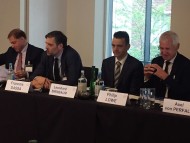The World Energy Council held an informative Insights workshop to coincide with committee meetings held in London 15 May.
Delegates were invited to participate in an interactive panel to discuss energy trilemma implications of distributed generation.

One of the key takeaways of the discussions that the whole panel agreed on, was the need for a transition from a supply to demand way of thinking. It was agreed that distributed generation (DG) should be thought of now as increasingly more of demand based issue rather than supply based, as more and more players are entering the space from this side.
Sir Philip Lowe, Executive Chair, World Energy Trilemma; who moderated the session, said: “Perhaps the energy sector has been too simplistic in the past, compared to other sectors, the energy sector has been very straightforward. Now it is focusing on consumers more, which other sectors have done for a while and are used to.”Dassa of EDF, emphasised the fact that the key challenge for distributed generation is how to turn this complexity into efficiency.
Dr Leonhard Birnbaum, Vice Chair for Europe, World Energy Council and Member of the Executive Board of E.ON SE, commented:
“DG means more of everything. More actors, more technologies, more generators, more options for consumers. But at the same time there is less control. We will say goodbye to completely controlled, centralised systems. Must just adapt since it will just happen.”
Carsten Stocker, of Innogy SE, said:
“We are seeing a paradigm shift from top down to bottom up. There is a lot of innovation going on from bottom up and this is developing more strongly. However, it requires a framework within which the innovation can take place to provide a context for sector coupling. Sector coupling can happen very fast on a local level.”
There was consensus among panellists that there needs to be more of a complete, integrated systems thinking approach at a city-scale or perhaps even larger; not just at a local level.
Mr Dassa commented:
“If we are using a systemic approach we must think about the potential costs. Network development. DG in a city is often more valuable since almost no price upgrade is required. However, in remote areas this can be up to 100 Euros / MW, where new locational signals that are required. We need to monitor the value of DG. This can be achieved through markets and regulation.”
Ian Gardner, a Director at Arup, argued that full systems thinking at a city level may be more important than thinking about whether decentralised generation should be implemented or not. Highlighting the fact that decentralised generation also impacts other sectors, such as transport and heating.
He said:
“Generating only locally in the future may not be possible, it may always need some backup in the form of centralised generation. If we are discussing systems thinking we also need to think about energy vectors. Renewables tend to take up a lot of space, which may not be adequate in a city, therefore it becomes more important to focus on these.”
Dr Birnbaum argued that systems thinking may be less important now because there are more players doing what they want and innovation will provide an outlet for this. In Germany the demand for storage/batteries has increased for 4-6 years in a row.
He commented: “However, from a systems thinking approach this may not be the most effective solution, as its still expensive; people want to be independent and may invest even when it does not make sense from a systems perspective. The role of a utility like E.ON is to coordinate this. Markets /players will innovate regardless.
“The Energy Trilemma exists always and has been existing for a while. However, certain players pay attention to the Energy Trilemma trying to optimise the Trilemma at a system scale. Other players don’t pay attention to the Energy Trilemma and just operate to harness the benefits of technology and innovation.”
Pricing was a divisive issue among panellists. Who will pay? There were differing opinions on whether or not this ought to be local, regional or consistent through a country. World Energy Council Secretary General, Christoph Frei, ended the discussion stating how the logic of decentralisation would suggest a tendency to a pricing system that is more locally focused.
Mr Dassa said:
“Because with decentralised generation one has to deal with the complementarity of investments. For example, sometimes 15 Euro of back-up is not paid for & 35 Euro of grid is not paid for. Who will pay for the fixed price of networks? There need to be investment signals. Regional pricing may be challenging difficult for a Frenchman to pay different prices for energy.”
There were differing opinions on what to do with regards to market regulation and the coordination of decentralised generation development some felt that it was more of a ‘natural’ process and so there should be a light-handed approach by the Government whilst others expressed the opinion that a market cannot function without regulation.
Who will pay for networks was agreed to be an important issue since there need to be clear signals for investors.
Mr Gardener commented:
“Somebody has to coordinate decentralised generation development. In Austin, Texas for example, Arup has been working with a school that is a net energy importer. It imports electricity when not needed. But this posing a burden on the population around the school. Unstable political environments do not help with this.”
Dr Birnbaum said:
“We won’t be able to plan energy systems to 2050. It is nearly impossible to plan 5 years ahead. So how is it possible to plan so far ahead and predict what the energy system will look like?”
Ewald Hesse, Vice President of the Energy Web Foundation, argued that 100 years from now aggregators will play a higher role. Technology such as blockchain will be able to embed regulations through complex nodal networks, meaning blockchain be a valuable solution for ensuring stable markets.





